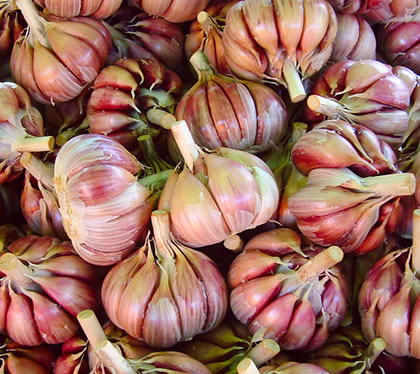If you eat enough of it, that is, huge amounts, (it’s doubtful if you will or can, but there are always those extreme individuals, including eating competitors – hot chili pepper gulpers, etc. -), you WILL get side effects! By a high dose we don’t mean a clove or two a day or every other day, but up to a whole bulb a day, including in juice form, consisting of like a dozen or so cloves or other large amounts for an extended period of time! At those high volumes, expect diarrhea, flatulence (gas), heartburn, headaches, hot skin and flushed face, sleeplessness, nausea, vomiting, increased heart beat, and, surprise, surprise, increased sexual desire. Also, heavy or unprotected external use of garlic can irritate the skin, causing inflammation and blisters.
When You Shouldn’t Eat Garlic
Moderate consumption, a few cloves a day, is considered safe for most people. (There are those individuals, however, who are simply allergic to garlic and should not eat it in any amount, or in amounts only allowed or prescribed by their doctors or health-care practitioners). In fact, garlic, as a food, is classified as non-toxic by the American Food and Drug Administration. Nevertheless, the use of garlic has its contraindications, especially as a medicine or in medicinal quantities for individuals with certain illnesses or symptoms. According to Paul Bergner in The Healing Power of Garlic, people with the following conditions should either avoid garlic altogether or avoid “large quantities of garlic or long-term use of medicinal quantities” of garlic and/or use it only under the supervision of their doctor:
- acute inflammation
- brittle diabetes
- dehydration
- hypoglycemia
- impending surgery
- insomnia
- organ transplant
- pemphigus
- use of blood-thinning drugs
Because of its powerful effect on multiple systems in the body, including the circulatory, immune, and metabolic, garlic can interfere with drugs or medications and their functions. For instance, persons taking certain AIDS/HIV medications should consult with their doctors before taking garlic since garlic may be incompatible with those drugs, causing side effects, or rendering them less effective. Also, since garlic is known for its blood-thinning capacity, it is not recommended to be taken in any significant amounts with blood thinning drugs. Garlic may also affect or aggravate certain conditions. People suffering acute inflammation and pain such as arthritis should not use garlic internally as it can increase the pain. Individuals scheduled for surgery are also advised to not take garlic at least one week before surgery to assure proper clotting of the blood.
Kyolic Garlic – a Milder Form of Garlic
It should also be noted that some people are less tolerant of the heating and drying effects of garlic because of their “body type” or physical constitution or condition. This is according to the concepts of Eastern traditional medicine such as the Ayurvedic and Chinese. In these systems, garlic is contraindicated in persons that experience dryness of the mouth and mucous membranes, are dehydrated, have a higher than normal pulse rate, among other symptoms. In such cases, garlic may aggravate the symptoms. Taking aged garlic extract called Kyolic garlic may be a solution for these individuals since most of the constituents that cause garlic’s heating effects have been removed from this form of garlic. Kyolic garlic, however, does not retain the full antibiotic properties found in raw garlic. Other ways to take garlic by those who are sensitive to it include chopping it in milk or water, or simply eating it in very small amounts or eating it off and on instead of on a daily basis.
Including garlic in our diet, in sensible amounts, of course, can help us maintain a healthy immune system to safeguard our health and prevent and treat a multitude of diseases and conditions.
Stay healthy. Eat Garlic!
